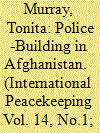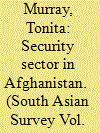| Srl | Item |
| 1 |
ID:
077183


|
|
|
|
|
| Publication |
2007.
|
| Summary/Abstract |
Despite considerable effort and large sums of money spent over five years of police reform in Afghanistan, the investment has yet to yield significant results. Among the reasons outlined in this article are the failure to distinguish clearly between the different roles of the police and the military in contributing to security sector reform; a lack of strategic vision and effective planning; and a failure to capitalize on the insights, best practices and lessons learned from the last 30 years of police reform in the West. Finally, recommendations are made for remedying current problems and re-directing reform to achieve greater effectiveness
|
|
|
|
|
|
|
|
|
|
|
|
|
|
|
|
| 2 |
ID:
093015


|
|
|
|
|
| Publication |
2009.
|
| Summary/Abstract |
The article presents an overview of the post-Taliban status of the security sector in Afghanistan, particularly the Afghan National Army and police, the courts and judiciary, prisons and security intelligence elements of the security sector. It is argued that uneven distribution of international funding means uneven reform and that if one part of the security sector is neglected in favour of another, all security reform is affected because the institutions are inter-connected. International reform and Western security models are useful but ultimately limited. They can bring about 'hardware' changes but the 'software' changes of culture, values and behaviour can be made only from within. Situating Afghanistan in the historical, cultural and religious context of South Asia and drawing its reform models from this region might be ultimately more effective for the future of Afghan security sector reform than what the present reform phase allows.
|
|
|
|
|
|
|
|
|
|
|
|
|
|
|
|
| 3 |
ID:
115338


|
|
|
|
|
| Publication |
2011.
|
| Summary/Abstract |
The security sector in Afghanistan has received intense international assistance and the investment of many billions of dollars in the nearly ten years since the fall of the Taliban regime, yet the country is still unable to maintain security and stability. While there are many obstacles to reform in the Afghan context itself, not the least being the present insurgency, the international community has made many mistakes that have prevented success. The police is perhaps more important than the military in peace-building, but it is the weakest of all the security forces. There have been three phases of police reform as the international community has tried to find the best approach, but the one factor that has not changed and is the greatest impediment to reform is the insistence on using a 'military model' for changing the police, and to use the police more than the army for fighting the insurgency. Now, there is another plan: to prepare the Afghan national security forces to assume leadership and responsibility for security in the country by 2014. Is this another international failure in the making?
|
|
|
|
|
|
|
|
|
|
|
|
|
|
|
|